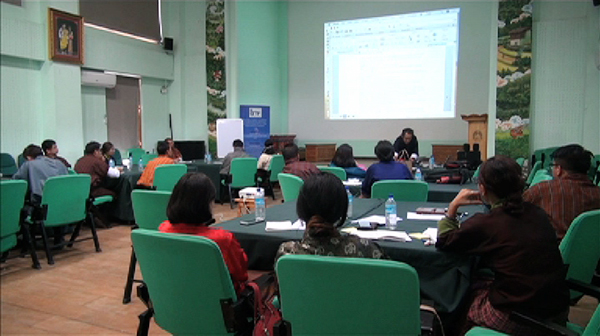 Unveiling issues related to climate change through the lens of media is considered by many to be one of the ways in mitigating climate change. Climate change is real, and like the rest of the world, Bhutan is also seeing the impacts of climate change every day.
Unveiling issues related to climate change through the lens of media is considered by many to be one of the ways in mitigating climate change. Climate change is real, and like the rest of the world, Bhutan is also seeing the impacts of climate change every day.
In line with it, Bhutan Media Foundation (BMF) extensively trained over 25 journalists from both broadcast and print media on how to bring out climate change-related issues to the limelight from as far as the rural communities and to inform decision-makers at the apex.
According to Needrup Zangpo, the Executive Director of BMF, the time to time training of journalists is important because “the newsrooms in Bhutan are constantly shifting. Senior people are moving out and a new crop of reporters are coming in. Therefore we need to keep upskilling our newsroom professionals. So this climate change reporting training is particularly important.”
The journalists were trained for three days by experts in the field of climate change. Giving voice to the voiceless especially in the rural communities that have been impacted by climate change and knowing the basics of climate change were emphasised during the training.
Phub Dem, a journalist with the Kuensel shares how an informed journalist can be the advocator of change. “I think journalists deal with climate change-related stories every day but we don’t really know the technicalities of climate change. We don’t know the basics of climate change and in Bhutan, there is a lack of research studies. From this training, I have learned how climate change is affecting the rural communities, what is the science and effects of climate change that are in rural communities. And now we as journalists can play a role in advocating and bring the voice from the rural communities to the policymakers or decision-makers about what they can do to address such issues,” she said.
Similarly, Kinley Yonten from Business Bhutan says the training will help equip the journalists in tackling climate change issues. “I am not really into climate change reporting as such but over the last three days, I have learned much more than what I have done in several stories in the past. Such training is really important for young journalists and reporters in our country because most young journalists don’t actually have the basics of climate change reporting,” he added.
And Lhakpa Tshering from Bhutan Times also says the training will be very helpful for the journalists covering climate change issues. “As of today, we really did not understand climate change issues well. After the training, I learned a lot from experts. If by chance, climate change takes its toll on the world, as journalists and with knowledge from such training, we will be able to perform well in such fields and would benefit a lot,” he said.
To encourage journalists to focus more on rural communities and climate change, BMF will also provide 10 selected journalists with grants to explore and report on climate change issues.
“This project is first of its kind in Bhutan because training will lead to two rounds of climate change reporting grants in which some 10 or 15 reporters from Bhutan will receive a certain amount to go around the country exploring and writing climate change stories,” said the Executive Director of BMF.
Since its inception in 2010, BMF fosters and strengthens professionalism in media through training, scholarships and media literacy.
Tshering Dendup









